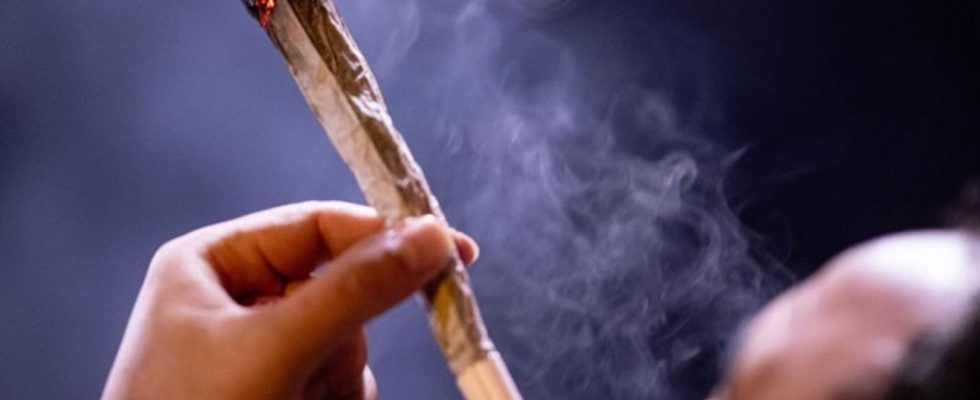Supporters celebrate, opponents throw their hands over their heads. As of today, smoking weed is legal in Germany. The new rules come with conditions. The criticism does not go away.
The Sahara dust had barely cleared when thick clouds of smoke rose around Berlin’s most famous landmark on the night of Easter Monday: According to police reports, around 1,500 people celebrated the legalization of cannabis for adults, which came into force on April 1st, at the Brandenburg Gate. Joints were demonstratively lit at midnight and participants danced to reggae music in an exuberant mood.
With legalization, Germany is taking a new path in drug policy after decades of discussions. Opponents renewed their sharp criticism of it when it came into force. Government representatives defended the new regulations.
Lauterbach: Historic opportunity
“Today we are ending a failed ban policy,” said Federal Health Minister Karl Lauterbach to the German Press Agency in Berlin and spoke of a historic opportunity. “From now on we are combining a real alternative to the black market with better child and youth protection. Things could not continue as before,” added the SPD politician.
Federal Justice Minister Marco Buschmann (FDP) expects that the judiciary and police will have less work to do in the medium term. “The change means a one-off increase in workload, but in the long term the police and judiciary will be relieved,” he told the editorial network Germany (RND). “You can then pursue even more relevant crime.”
The government argues that cannabis consumption has increased despite the ban, the black market is growing and cannabis purchased there may be associated with increased health risks. The active ingredient content is unknown and it could contain toxic additives and impurities.
Legalization in two steps
As a first step, the possession, private cultivation and consumption of certain amounts of cannabis were permitted for adults. From July, in a second step, so-called cultivation associations will be allowed to grow cannabis under strict conditions under state control and distribute it to their members. At the same time, the law provides for measures to prevent addiction.
When the changes came into force, cannabis disappeared from the list of prohibited substances in the Narcotics Act. Adults are allowed to carry up to 25 grams of the drug in public and a maximum of 50 grams at home. It is also permitted to grow up to three cannabis plants in the living area. Smoking weed is allowed in public, but not near children and young people, schools, daycare centers, playgrounds and sports fields and not in pedestrian zones during the day. Cannabis remains taboo for young people under 18.
Union: Black day for child protection
The CDU and CSU reiterated their strict rejection of legalization. The health policy spokesman for the Union parliamentary group, Tino Sorge (CDU), told the dpa: “In fact, April 1st is a historic day. It will go down in history as the day on which the traffic lights announced an unprecedented economic stimulus program for the black market “In the coming weeks, illegal cannabis from old stocks will flood the market.” Sorge called legalization in its current form a risk to internal security. “We will reverse them after a change of government.”
Bavaria’s Prime Minister Markus Söder wrote on X (formerly Twitter) that Germany was harming itself and endangering the health of the population with the cannabis law. “Our country is on the wrong track.” Söder spoke of a fatal mistake and reiterated his announcement that he wanted to make things particularly difficult for stoners in Bavaria. The law will be applied extremely restrictively.
Police fear conflicts during controls
The German Police Union had previously criticized such announcements. This would put the authorities and police in a position where they would have to monitor very closely, said Bavarian state chairman Jürgen Köhnlein. However, precise administrative regulations and personnel were missing. There are significantly more offenses in the cannabis law than before. “It’s going to be very, very complicated.”
The police union (GdP) also expects problems with controls. “Conflicts are inevitable,” said Federal Deputy Chairman Alexander Poitz to the dpa. “We are sure that due to various ambiguities and a lack of legal definitions, there will be clearly noticeable dissatisfaction, uncertainty and mistakes among everyone involved.”
Medical concerns
During the consultation process on the law that has now come into force, medical associations also raised concerns, especially with regard to health risks for children, adolescents and young adults. Cannabis remains legally taboo for people under 18 years of age. The German Society for Psychiatry and Psychotherapy, for example, had pointed out that brain maturation is only complete in the mid-20s and that earlier cannabis consumption increases the risk of psychosis.
Overall, the legalization is significantly narrower than the traffic light originally planned. The plan to enable the free sale of cannabis and cannabis products in special shops, such as in the USA or Canada, is currently on hold. EU legal concerns contradict this. That’s why Lauterbach announced that he would first test this in model tests limited in time and region.
The federal government’s drug and addiction commissioner, Burkhard Blienert (SPD), called on the traffic light coalition to take action here: “With the first step, we are only creating improvements for regular users. But now it is absolutely necessary to round things up and to decide on the model projects as a second pillar,” he told the RND. This is the only way to ensure that occasional consumers no longer have to go to the dealer.

